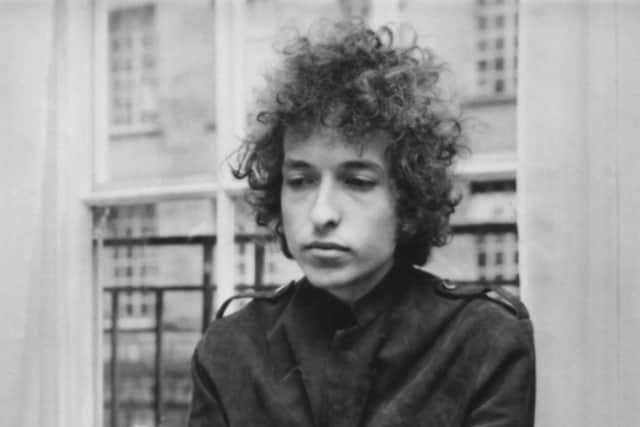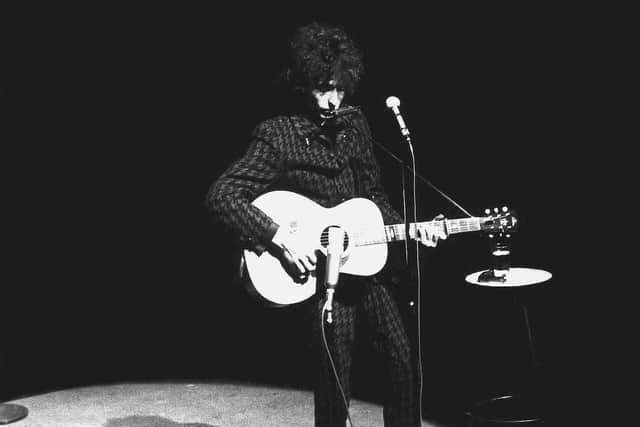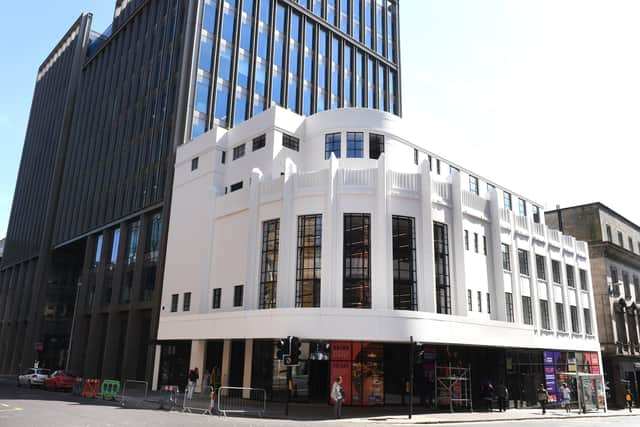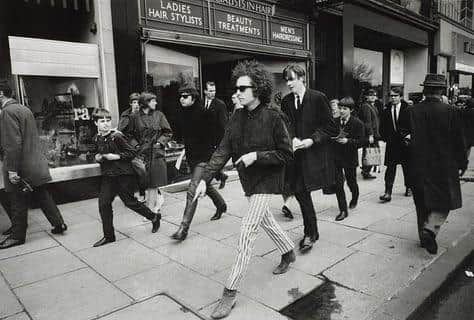Dylan Goes Electric: Remembering Bob Dylan’s chaotic first visit to Glasgow in 1966
and live on Freeview channel 276
Back in 1966, Bob Dylan came to Glasgow amidst the biggest crossroads of his career. Before he became an established icon of the American songbook, it was Dylan’s controversial switch from folk music to electric guitar that provoked the ire of hundreds of thousands of music fans across the world, creating a culture war focal point at a tumultous time in history. This all played out against the backdrop of his first performance in the city.
The cold war was at its peak, America had begun the invasion of Vietnam just a year prior, and to top things off the biggest folk artist of the era had decided to move on.
Advertisement
Hide AdAdvertisement
Hide AdA large swathe of the music world placed their anxiety around the rapidly changing world onto Bob Dylan, who had decided to eschew his folk roots in favour of a more modern sound with electric guitars.
It was in the middle of this controversy on May 18, 1966, that Dylan arrived in Glasgow, ready to play a gig at the Odeon Cinema on Renfield Stret.
Just a day earlier Dylan had played one of the most stressful gigs of his career at the Manchester Free Trade Hall - in which members of the crowd shouted ‘Judas’ as he began to play on electric guitar.


Commenting at the time, Bob Dylan said:‘Judas, the most hated name in human history! If you think you’ve been called a bad name, try to work your way out from under that. Yeah, and for what? For playing an electric guitar?’
Advertisement
Hide AdAdvertisement
Hide AdMany folk fans viewed Dylan as a turncoat for his decision to switch to electric, even though he still began his gigs with solo acoustic sets - this wasn’t enough for the betrayed, who thought his electric switch-over was a sign of conformity and that the artist was out of touch with the many issues weighing on the minds of the people of the era.
While hecklers were certainly not absence from the crowd at the Odeon cinema – Glasgow’s Young Socialists group had tried and failed to drown out the band when they came out for the electric second half – it’s recorded that Dylan’s new electric fans had begun to outnumber his folk detractors.
Responding to the chants from the Young Socialists of “we want Dylan,” the music legend quipped: “Dylan got sick backstage. I’m here to take his place”.
Evidence of Glasgow’s support for the man, who was gearing up to release his seventh studio album Blonde on Blonde in June a few short months later, is clear the moment you speak to anyone who attended the gig.
Advertisement
Hide AdAdvertisement
Hide AdFrank Carolan, who was present at the gig, says the minority intent on spoiling the second half of the gig that night left him scratching his head.


Mr Carolan told The Scotsman: “I just couldn’t get my head around the booing. Here was one of the most amazing songwriters ever on stage and trying to take his music into a new vein.
“His expansion of the music was to me total eye opener. Bob wasn’t content unless he was trying new things.”
Shocking as it was at the time, the sudden rejection of Dylan by his legion of older fans had come as little surprise. He was destined for reinvention.
Advertisement
Hide AdAdvertisement
Hide AdBefore 1966, Dylan, real name Robert Allen Zimmermann, had been hailed as a hero of folk music, carrying the torch of the likes of Woody Guthrie and distributing that same energy and ethos to the masses.
His live backing band, The Hawks, had been targeted by the traditional folk side of Dylan’s fanbase - which when they arrived on stage, served as a signal for the folksie lot to begin booing and jeering.
It was a year prior at the 1965 Newport Folk Festival that Bob Dylan made the first leap towards amplification, splitting his legion of fans down the middle in the process.
Bob Dylan’s introduction to Glasgow – the first of many – was a memorable one for Sadie Lawn. She’d been gifted the tickets as part of her 21st birthday.
Advertisement
Hide AdAdvertisement
Hide AdWhen Dylan plugged in for the second half, she says there was the same knee-jerk reaction that had been witnessed elsewhere – but the ill feeling would prove short-lived.


She said: “There was nearly bloodshed when the electric guitars started. People were walking out and shouting about him being a sell-out and things like ‘you’ll never be a Woody Guthrie’, but it soon calmed down into a fantastic concert.
“We had the best night ever”.
Reflecting on the crowd that evening, Mike Robinson reckons the band’s volume played a part in eventually conquering the folk purists.
“It was the most incredible performance,” Mike, now 72, recalls. “The first half was brilliant, and then the chaos started with, ‘Judas!’ and ‘”where’s Dylan?’.
Advertisement
Hide AdAdvertisement
Hide Ad“My recollection is that God had arrived, that sort of thing. I’ve no memory of any noise or shouting in the first half, but, literally, as soon as they came out with the band and plugged in the electric guitar, it all started.
“There was one song they did in the second half, and they got around half the way through before stopping because of the heckles.
“Dylan then communicated to his band to simply play louder, and they really went for it from there.
“Funnily, one of the things I remember most was the price – 15 shillings for the front stalls. I’d been to see The Beatles four times, and the total cost had been just £2.”
Advertisement
Hide AdAdvertisement
Hide AdWhile the show passed without major incident, there were other ugly moments during Dylan’s Glasgow stay, including the tour bus being smashed up and equipment stolen.
One incident has entered local rock n roll legend.
Bob and his entourage were staying at the North British Hotel adjacent Queen Street Station, and had ordered food to their room.


When the waiter arrived, Dylan was met with a mouthful of abuse from the employee, who allegedly screamed “f**k him” at the American star and branded him “a f*****g traitor to folk music”.
Dylan’s security man Tom Keylock received a nasty injury in his attempts to usher the man out of the room.
Advertisement
Hide AdAdvertisement
Hide AdHe recalled: “He pulls a knife on me. I’ve still got the scar to prove it. So I gave him a good kicking.”
Despite all the controversy swirling around him, Bob Dylan still found time to hold court during his stay, jamming with Canadian musician Robbie Robertson - they wrote an unreleased song together.
He spoke to local kids as he left the city, slightly bewildered.
The day after the Glasgow gig, Dylan and The Hawks, which later became The Band, made their way to Edinburgh to play another cinema, this time the ABC Regal on Lothian Road.
Advertisement
Hide AdAdvertisement
Hide AdIn contrast to the night before, the trad folk crowd were out in full force, and a portion of the more militant among them produced mouth organs and attempted to disrupt the amplified second half of the show.
As it turned out, the harmonicas were no match for the Minnesota music icon and his thunderous new electric sound.
Setlist: Bob Dylan Glasgow 1966
Acoustic
It’s All Over Now, Baby Blue
Desolation Row
Just Like a Woman
Mr Tambourine Man
Electric
Tell Me, Momma
I Don’t Believe YOu (She Acts Like We Never Met)
Baby, Let Me Follow You Down
Just Like Tom Thumb’s Blues
Leopard-Skin Pill-Box Hat
One Too Many Mornings
Ballad of a Thin Man
Like a Rolling Stone
Comment Guidelines
National World encourages reader discussion on our stories. User feedback, insights and back-and-forth exchanges add a rich layer of context to reporting. Please review our Community Guidelines before commenting.
